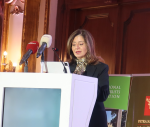You are here
An inspiring sentence
Feb 18,2018 - Last updated at Feb 18,2018
It is not every day that one finds happy and inspiring news from the Middle East, but today I take this rare opportunity to add my voice to those who rightfully applaud Lebanese Judge Joceline Matta — Arabic for Mathew — for setting a very important legal precedent in contemporary Arab history.
Judge Matta had before her in court three young men charged with making offensive remarks against the Virgin Mary. Insulting religious symbols is a crime that carries a prison sentence between six months to three years, but the judge was keenly aware of the sensitivities involved.
Since the judge was Christian and the offenders were Muslims, a prison sentence would not have made them see the error of their ways. It would probably have intensified their bigotry and hatred by allowing them to pose as victims of sectarian vengefulness and injustice.
So, to leave them in no doubt that they were culprits not victims, Judge Matta gave them three days to learn by heart the references to the Virgin Mary in the Koran, which holds her in immense reverence, and to recite them in court.
No Muslim can describe this sentence as unjust, because Muslims are required anyway to read the Koran and be guided by its message. Moreover, to show the offenders that they were in error, the judge invoked a text, which according to the faith they claim to uphold, is the infallible word of God.
At the same time, the task carried an element of difficulty because the references to the Virgin Mary in the Koran appear in Surat Al Imran, which is the second longest chapter in this holy book.
At a time when the world struggles with the rise of xenophobia, which uses every vehicle imaginable to peddle hatred and bigotry, including nationalism and religion, we need more people like judge Matta who have a broad-enough education, culture and good judegement to act with perceptiveness and wisdom.
On a broader theme, this is an important lesson in good leadership to the Arab world. Good leadership is very important. Only a few days ago, someone told me with excitement about the organisation she works for: “Now we will get back to doing good work. The new boss is a good, fair-minded and hard-working man.”
Good leadership has many requirements, in which technical competence is only one. It also requires the wisdom that comes only from long experience, firmness against wrongdoing, and empathy because people should follow their leader willingly not by compulsion. But above all, good leadership should inspire hope.
These appear to be too many qualities to expect from one person, but they are not. We all remember with fondness good schoolteachers who, though demanding, made us look forward eagerly to their classes, and who instilled in us a love for the subject matter even though it was difficult.
Unless the Arab world allows people with good leadership qualities to accede to positions of leadership, it will condemn itself to dwelling forever in underdevelopment.












